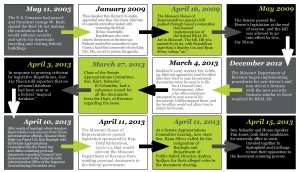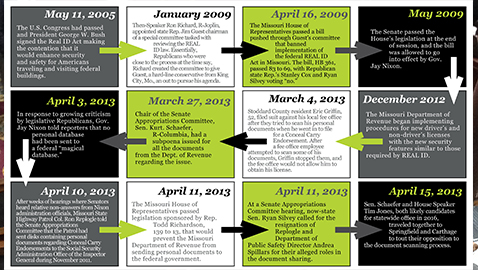By Eli Yokley
JEFFERSON CITY, Mo. — When lawmakers learned last week that the State sent a list of names of Missourians with permits to carry concealed weapons to the federal government, blood spilled in the water, sparking new outrage from a Republican Party looking for ways to criticize the Nixon administration — as well as the man Democrats are hoping to tap to replace him.

The controversy led to the resignation of Missouri Department of Revenue Director Brian Long on Monday. Long joined Nixon’s administration two days after the department began implementing new identification procedures at the center of the controversy.
Nixon’s office said Monday that John Mollenkamp, deputy director of the department, had been promoted to acting director of the agency.
Last Thursday, Missouri State Highway Patrol Col. Ron Replogle said that during 2011, the patrol turned over encrypted disks of data regarding individuals with Conceal Carry Endorsements to the Social Security Administration’s Office of the Inspector General.
Replogle, as well as Andrea Spillars, director of the Missouri Department of Public Safety, said the state was well within the law in doing so.
But Replogle’s admission came after weeks of administration officials, as well as Gov. Jay Nixon himself, denied that any documents had been sent to a federal government database. Spillars, in her testimony, said the officials had been telling the truth — no data had been sent to some “magical database,” as Nixon called it — but the sparring over semantics gave the perception of dishonesty to skeptical lawmakers, some of whom are looking to position for possible statewide candidacies in 2016.

Chief among them: House Speaker Tim Jones, R-Eureka, and Sen. Kurt Schaefer, R-Columbia. The two lawmakers, both mulling candidacies for Attorney General, held dueling media events Thursday, the day after the news broke. Schaefer held his in his office, joined by Lt. Governor Peter Kinder and Stoddard County Prosecutor Russ Oliver, whose litigation in March sparked the interest of lawmakers in Jefferson City.
Schaefer said his outrage was based on the fact that the Department of Revenue appeared to be implementing parts of the REAL ID Act, a federal law passed during 2005 and signed by President George W. Bush that sets some national standards for driver’s and non-driver’s licenses (including conceal carry permits), despite the fact Missouri lawmakers passed legislation during 2009 attempting to nullify the law.
“Why wasn’t the General Assembly informed,” he asked, noting his belief that the entire issue was about “identity security.” Schaefer added that he believed whoever gave the documents to the federal government was in violation of state law banning the distribution and showing of confidential documents.
Despite the positioning from the two, and others, Jones said the issue is not about politics.

“This is not partisan,” he said in a news conference in front of Attorney General Chris Koster’s office in front of the Supreme Court building. “This is about protecting people’s rights.”
There, Jones called on Koster, who had just announced his interest in seeking the governor’s position, to establish a special investigatory committee to see if any legal wrongdoing had occurred.
Koster’s office has not publicly replied to Jones, but the issue, the first major controversy of Nixon’s second term, has become one where Republicans are looking to apply real pressure on Koster. Using a theme from party Chairman Ed Martin’s 2012 campaign for Attorney General, the GOP joined Jones’s call for Koster to investigate the Department of Revenue, renewing Martin’s Twitter hashtag, “#AllPoliticsNoProsecutor,” a play off of Koster’s successful campaign theme, “All Prosecutor, No Politics.”
While last Thursday was perhaps the most intense day of news regarding the issue so far, the issue is not stopping. Schaefer’s committee is still digging into boxes of hundreds of documents delivered to them by the Nixon administration, Auditor Tom Schweich is looking in to the fee offices that issue permits and collect the data, and Rep. Jay Barnes’s government oversight committee may begin its own investigation, where Jones has promised subpoena power akin to that given to Schaefer’s committee.
On Monday, Jones and Schaefer flew together to the Springfield and Joplin media markets, ground zero in the battle for conservative primary voters, to tout their trifecta play: investigating the Democrats, standing up to the federal government, and, of course, standing up for gun rights.
Last week, the House passed Rep. Todd Richardson’s bill that would explicitly ban the Department of Revenue from scanning personal documents. Additionally, Sen. Eric Schmitt, R-Glendale, called on the department to propagate rules regarding data sharing, so his Joint Committee on Administrative Rules can give them a thorough review.
“The rulemaking process contains important safeguards for the public. Citizens have a right to comment on rules that will seriously affect them. The department ignored that right,” Schmitt said in a statement. “Equally disturbing is that the General Assembly was completely kept in the dark, preventing us from vetting this new policy, a critical part of representing the people’s interests.”
Aside from legislative action, the Stoddard County lawsuit is also still pending. The issue first emerged when Stoddard County resident Eric Griffin, 52, filed suit against his local fee office after they tried to scan his personal documents when he went in to file for a Conceal Carry Endorsement. After a fee office employee attempted to scan some of his documents, Griffin stopped them, and the fee office would not allow him to obtain his license.
Additional reporting by Collin Reischman.




